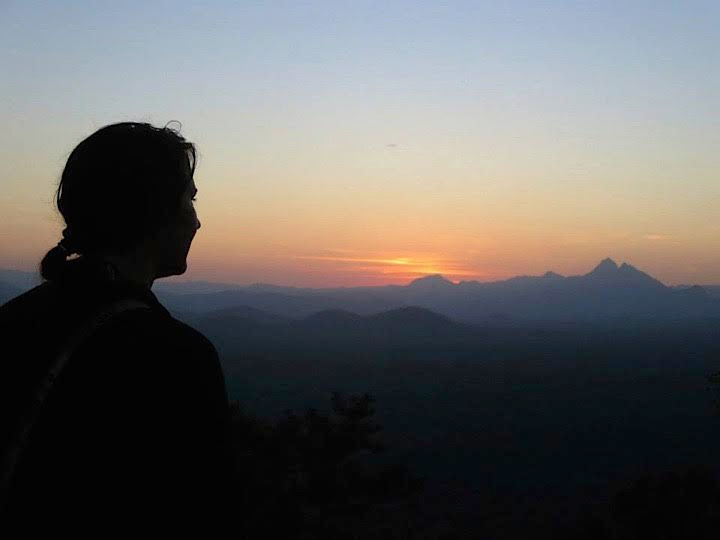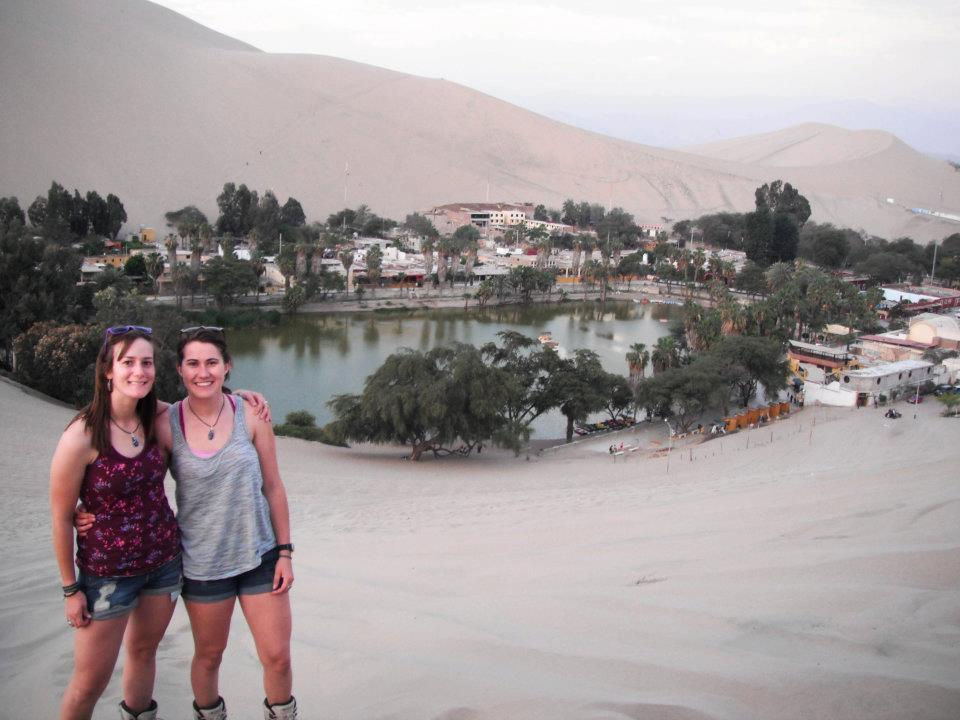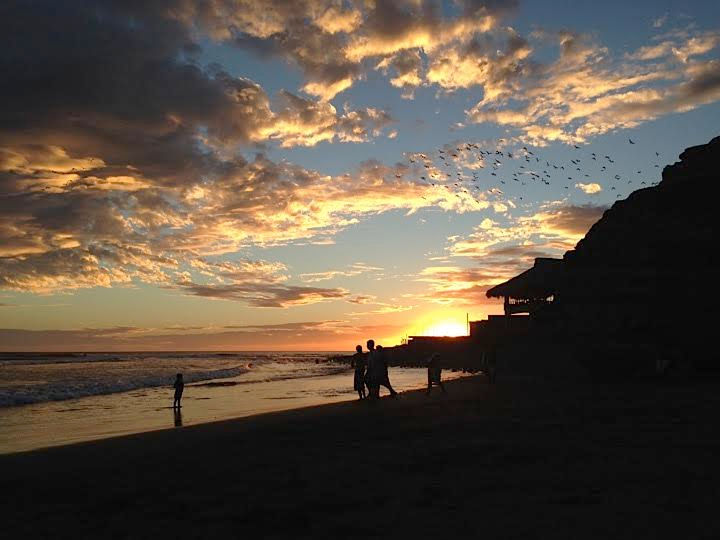
Aaren Ritchie-Bonar
What is Global Competency?
Global competency is a hard concept to define, but circulates around the idea of having knowledge, experience, and attitudes that can be applied to global issues, interconnectedness, and working within and across cultures. For a more thorough understanding, check out the link below on what global competency is from a publication from the NAFSA website by Language Corps.
I am applying for the certificate of Global Competency from Thompson Rivers University as I believe my education, experiences, and knowledge I have gained over the past five years have developed my understanding of the importance to be a global citizen and how to contribrute in the future. Below are links, photos, and descriptions of how I meet the requirements to be considered as "globally competent".
International Experience

Jenna and I in Huacachina, Peru.

In front of Machu Picchu, Peru.

Jenna and I in the traditional Mayan dress, courtesy of our hosts on Amantani island on lake Titicaca, Peru.
Experience in Canada
My international experience began when I was 19 and travelled to South America. It was my first trip outside of North America, as well as my first major trip without my parents or any form of supervision. I got the opportunity to travel with my best friend, and met up with several other friends in Bolivia, Peru, and Colombia. To say it was an eye-opening experience would be an understatement.
Not only did I get to see some amazing places including a World Heritage site, I got to experience new cultures that gave me an appreciation for what I have. For example, in Peru we visited the floating reed islands on Lake Titicaca, which were historically used for defensive purposes, but are now maintained for mostly tourism. During this visit we got to stay on one of the main islands, where we shared a local Uru home. They took us to a community dance as well as fed us traditional meals that they grew themselves, which was a heartwarming yet somewhat humbling experience. Previously to this trip I had never made anything truly from scratch for sustinance, such as clothing or food. On the island they grew everything they needed, and made all of their own traditional clothing by hand, as well as other articles such as scarves and hats to sell to tourists for extra income. Seeing how hardworking and happy this family was with the amount they had compared to what I had back home gave me an enormous amount of respect for them, and made me committed to being more appreciative and happy with the things I have in life.
Other important stops along our trip were to Machu Picchu, as well as the sea walls in Cartegena. Just seeing how old these structures were and with the amount of precision and engineering capable at the time were eye-opening. Not having many man-made structures in British Columbia that span hundreds (to thousands) of years old, with the accompanying history are available as tourist destinations. Being able to view these places and learn about them made me think more about human history, and the significance of special places. Visiting these sites definitely made me more critical of the protection of historic sites back in Canada, especially ragarding sites referred to as sacred by First Nations people in Canada and B.C.
Independent Travel

My mom and I excited to hit the road out of Belize!

A beautiful sunset at El Tunco, El Salvador.

My mom and I on our hike up Volcan de Fuego, (Fire volcano) in Guatemala.
Study Abroad
I studied abroad for the winter semester of 2014, at the University of Belize, in Belmopan, Belize. This was an incredible experience for me, as living and studying abroad is a much different experience than backpacking from country to country. I had the opportunity to travel independently with my mom for three weeks before school started, which was fun and adventurous. We hiked a volcano and visited some Mayan ruins in Guatemala, and surfed and went hiking to waterfalls in El Salvador.
Once school started, I decided to tryout for the university womens football (soccer) team, and eventually went to the Belize national championship as well as the Central America University Games in Nicaragua. While at the games in Managua, Nicaragua, we experienced an earthquake on the same day we visited the old home of the Somoza family, who ruled Nicaragua for 44 years as dictatorships. That single day was eye-opening for me, and gave me a whole new perspective and appreciation for other countries national history and politics.
Having the experience of studying in Belize also made me realize how good we have it in Canada, but also how many of us take so many things for granted. For one, the University has no air conditioning, only fans, which in the heat and humidity of Belize can be torture (at least it was to us from Canada). I also experienced how hard it was to get schoolwork done when you don't have the same use of technology as most people. I did not bring a personal laptap, and had to use the limited computers and printers at school, and coupled with internet that was not as fast as I was used to, I struggled in keeping up with my assignments. At the same time, I was impressed with the hard work and extra-curricular activity of many of my Belizean classmates. Some not only excelled in classes, but also were extremely diligent in activites that helped make Belize a better place. This included participating in the university Environmental Club, as well as the International Forestry Student Associaton chapter in Belize.
Altogether, my experience studying in Belize gave me a greater appreciation for the things I have in my life, as well as the desire to participate actively in my community and to make it a better place to be.
International Volunteering
Although short in duration, my experience while volunteering for the International Forestry Students Association in Belize was very worthwhile. For one weekend, the IFSA and UB Environmental Club followed the annual La Ruta Maya canoe race, that takes place over three days and runs from the western border of Belize all the way to the Caribbean Sea. We hit all of the major viewpoints to cheer on the UB teams competing, as well as collect all of the garbage left discarded by the many fans.
This was a gratifying experience, as I had already come to love how beautiful and diverse Belizes environment is. Getting to participate in an activity that helped maintain Belize with low amounts of garbage around it's riparian areas while cheering on a major sporting event is an experience I won't forget.
Work as a TRU Study Abroad Ambassador
For the past two years (2014-2016) I have worked as a study abroad ambassador. This has involved working in seperate teams in operations and planning, as well as marketing and promotions in order to provide peer to peer support and promotion of the program to other TRU students. Not only has this program allowed me to expand my teamwork and interpersonal skills, it has also given me the opportunity to bring together students from different universities and countries, as well as see many other students enbark on study abroad exchanges due to the hard work of the team I work with.
Being a part of the study abroad team also gave me a greater appreciation of the diversity on the TRU campus, especially with the amount of events and organizations belonging to the TRU community. Becoming an ambassador required more cross-campus networking skills, and included working with groups such as TRU World, TRU Business Kickstart, TRU Media, TRU Counselling Services, TRU Students Union, TRU Catering, and more. Working as an ambassador has given me a huge awareness of what is going on in my community, something that I often find I am passing on to those around me, who would often not know about all of the behind the scenes events on campus!

Me and three other 2015/2016 study abroad ambassadors at the fall Business Kickstart.

Some study abroad ambassadors with the TRU International Council at a social event.

Me with the golden moose, in recognition of my work as a study abroad ambassador.
While at TRU, I took an Anthroplogy class focussed on minorities in the modern world (ANTH 2600). We specialized on LGBT groups, the history of midwifery, homelessness at Vancouvers downtown eastside, and many other short case studies. This was an interesting class, as I have been used to taking science courses that are more black and white, or right or wrong in thinking. This class really challenged my ways of thinking, and helped me to dissect human issues and problems. I would say that it expanded my perspectives on minorities in Canada and other parts of the world, and to be more empathetic especially until you can understand someone else's situation. Below is a link to an essay I wrote for this class regarding a book we read, that looked at the history of birthing and mothers rights with an American focus.
Credit Course